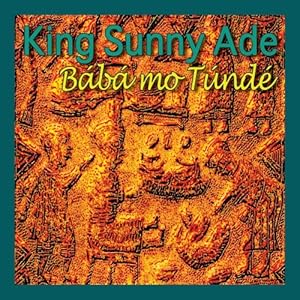 King Sunny Ade, Baba Mo Tunde [IndigeDisc, 2010]
King Sunny Ade, Baba Mo Tunde [IndigeDisc, 2010]
Ah, Sunny Ade, the Juju King. He was the first African musician I got turned on to more than a quarter century ago, when he was being marketed as a successor to Bob Marley and a gateway opener to a world of music beyond the boorish excesses of ‘80s mainstream pop. He certainly wasn’t the former but he largely was the latter, at least to me.
I soon learned that there was much more to Ade than what was represented in the shortened, presumably more listener-friendly-to-American-ears tracks that comprised his earliest stateside releases. No doubt, the juju sound of this enthroned Nigerian musical ambassador, with its interlocking guitars, massed percussion, joyous call-and-response vocals and relentless forward motion, was meant to go long. Re-releases of his back catalog marketed primarily for African consumption showed just how brilliant he and his band were in extended form, and a nearly all-night concert I had the good fortune (and stamina) to attend a few years back was an unforgettable experience.
Now, on the first Sunny Ade studio album in a decade, he goes to great lengths – or downright epic lengths – to please. Baba Mo Tunde is a double CD set in which the shortest song is just under nine minutes and the longest well over half an hour. Actually, it’s even longer if you include the remix (a first for Ade) that follows. True to form, Ade is not just filling space or killing time, even when familiar riffs or revisited lyrics are present. The tracks (with a seemingly higher ratio of fast ones than ever before) are rich in intricate conversation between traditional and electric instruments, passages that build to dizzying lock-ups of rhythm and melody and a tightness that feels superhuman. Keyboards have a more audible role than previously, bringing tinges of jazz and funk. Ade’s vocals have gotten a shade gruffer, but he still spars in supple style with his background singers, spinning parabolic and playful musical tales built as much from Yoruba tradition as modern recording techniques. Despite the sheer might of the guitars, talking drums, omele, sakara, shekere, bass, keyboards, drum set, additional percussion and multiple voices necessary to this music, it never sounds like too much. In fact, it breathes so deeply that you’ll have no trouble finding room to dance or simply stretch out and enjoy the fact that the King is back and in royally good form. Be sure to especially savor the final track, “Eyi Ma Dun To,” which sounds almost Oriental in its angular structure and beautifully odd rhythm.





